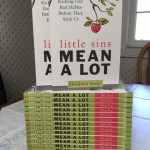The Word and Silence Glitters Gold
Jerid miller’s piece on Verbum Domini landing at The Catholic Answer in the same month I debut Domine exaudi is one those small-but-happy synchronicities that make you feel you’re being looked after. Small bites of Pope Benedict XVI’s beautifully wrought exhortation, taken in concert with other sacred reading, seem to flavor all of my study with a consoling steadiness that builds from a single line to which I keep returning: “The realist is the one who recognizes in the word of God the foundation of all things” (VD 10)
When I read the line I gasped at it’s simple profundity. If this is true, and if the Word of God, the Logos existing before all things is all-good, then it follows that all created creatures, all things are good and founded upon this Word. On some level we must know this to be true, yet only a relative handful of human beings, among the billions who have walked the earth, seem to have found it obvious.
Gilbert Keith Chesterton was nonesuch, as evidenced in the unending sense of surprised delight he had of the world and everything in it. He found newspaper ink as wonderful as beach glass, which –- it went without saying — was as passingly glorious as a good cigar or a glass of beer. As awe-struck and grateful for the world as a teenager in love, he pondered the unconditional gift of days, asking “why am I allowed two?”
In Chesterton’s wordy, boisterous sphere though, how did he gain his wondering insightfulness? He lived and breathed the 19th-century equivalent of social media (what a blogger he would have been!) of which our Holy Father writes, “Ours is not an age which fosters recollection; at times one has the impression that people are afraid of detaching themselves, even for a moment, from the mass media. For this reason, it is necessary nowadays that the people of God be educated in the value of silence. . .only in silence can the word of God find a home in us, as it did in Mary, woman of the world and, inseparably, woman of silence.” (VD 66)
Do we lose sight of God’s ever-present Goodness simply because we are under-exposed to true silence? For all his gregariousness Chesterton’s mostly unplugged world provided necessary pockets of deep silence, a different means of connectedness which we lately encounter only by force of will.
To consent to be in silence is a kind of humility, as it involves a giving up of the self. Saint Therese Couderc, the 19th-century foundress of the retreat-focused Sisters of the Cenacle began to assist retreatants toward collectedness, only to be forced — through cruel administrative mismanagement, but mysteriously by the will of God — to live deeply within silence and devalued by her own community. In that silence, she was granted one moment of particularly glittering insight, one which supports Benedict’s exhortation:
“I saw written as in letters of gold this word Goodness, which I repeated for a long while with an indescribable sweetness. I saw it, I say, written on all creatures, animate and inanimate, rational or not, all bore this name of goodness. I saw it even on the chair I was using as a kneeler. I understood then that all that these creatures have of good and all the services and helps that we receive from each of them is a blessing that we owe to the goodness of our God, who has communicated to them something of his infinite goodness, so that we may meet it in every thing and everywhere.”
In a sense, Couderc was privileged to “see” the Logos of all origins, contained in the single word “goodness,” made plain to her through the humble act of acquiescing to silence, which, it seems may be golden, after all.











